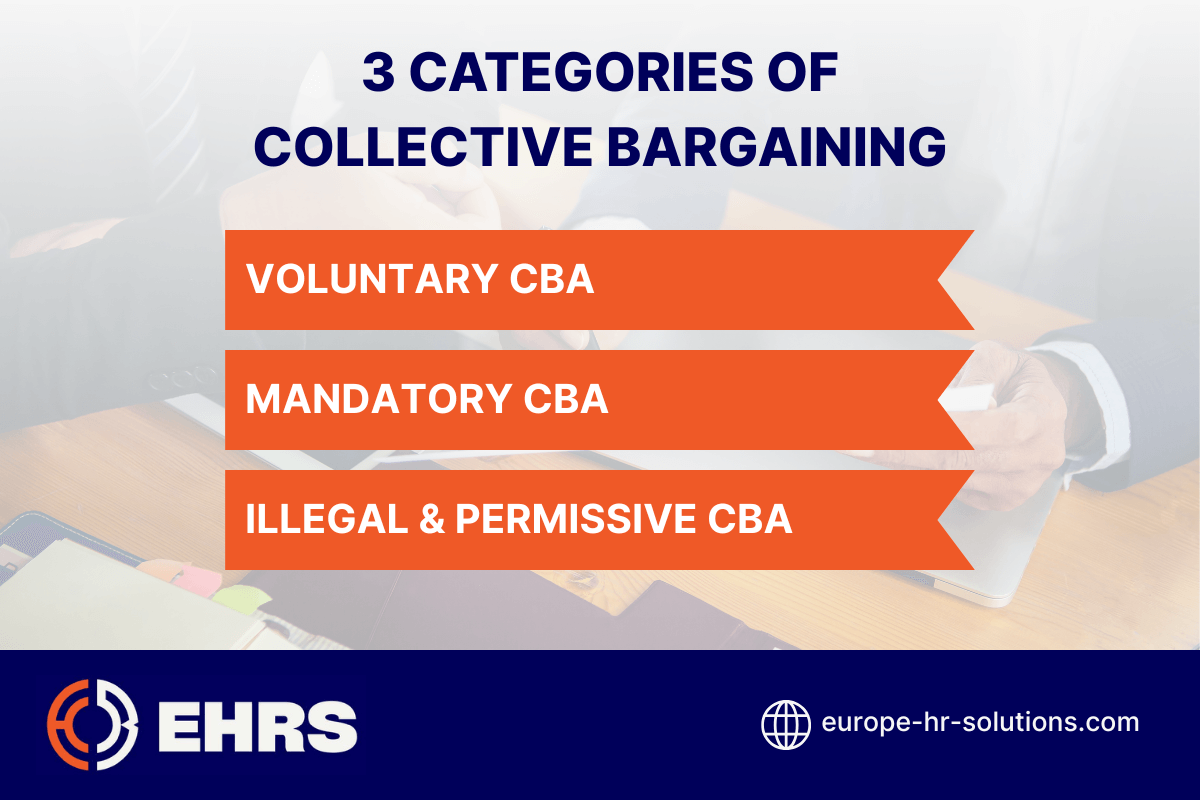When a company wants to expand their operations in the European market via a Payroll model or maybe a PEO, then it has to adhere to a CBA.
CBA stands for Collective Bargaining Agreement, also known as Collective Labor Agreements, and today we’ll talk about the European guidelines and what is required from companies to be in full compliance.
What is a Collective Bargaining Agreement (CBA)?
Collective Bargaining Agreements (CBAs) are formal written agreements between trade unions and employers and usually outline employment conditions that are specific to some industries and/or sectors.
In the US, for example, unions typically have low impact on organization policies, but in Europe, businesses must frequently upgrade their HR practices and employment contracts, depending on the country of operation.
What is the Purpose of a Collective Bargaining Agreement?
The main purpose of a Collective Bargaining Agreement (CBA) is to set forth a legally binding contract between trade unions and employers.
This includes agreements and details on working hours, salaries, job security, benefits, and other key elements. The CBA’s main goal is to protect the workers’ rights while also providing clear guidelines to employers in order to maintain fair treatment and ensure no disputes arise.
When do CBAs Have Effect?
The specifics of how CBAs function vary across different countries and continents. That said, there are some general principles to follow in order to simplify the complex aspect for better understanding.
1. National Law & Legal Precedent
The key aspects are determined at a national level by a clear legal framework of the host country. This is usually defined by legislation or a labor code or legal precedent, depending on the host country.
2. CBAs Specification
CBAs work to direct how those national standards are presented and interpreted and if they can be further improved for the entire industry.
3. Work Councils, Contracts of Employment & Company Policies
After the interpretation, navigating through work councils, application or extension to CBAs, company policies, and contracts can shape or further improve the necessary aspects of these agreements.
3 Collective Bargaining Categories
Collective Bargaining Agreements address different aspects of the relationship between an employer and an employee.
These can be classified into 3 main categories, depending on level of obligation for all parties involved:
a) Voluntary CBA
Voluntary subjects refer to issues that are negotiable but not required legally to be included within collective bargaining. These include topics like employee representation percentage on company boards, union communication methods, or procedures for applying for leave.
b) Mandatory CBA
Mandatory subjects are those that are governed by regulations and national laws, and typically cover the key areas, like minimum wage, health and safety standards, health and benefits, overtime pay, and layoffs and procedures.
c) Illegal & Permissive CBA
Illegal subjects refer to issues that are prohibited by law, like discriminatory practices or using any form of union busting.
What is a CBA in Sports?
Professional sports team owners hold substantial power as a group and as individuals themselves, respectively. To counter this, professional athletes in all major leagues have established unions to protect their interests and rights through these Collective Bargaining Agreements.
These agreements are fundamental for both players and owners and everyone must adhere and comply with these regulations.
Additionally, the CBAs need to regulate the actions of all others who are involved in the sports league, like league management, player agents, or freelance managers.
Unions are created in every major sport within Europe, and in the US, they are also known as player associations, having a presence in every major sport. What both EU and US unions have in common is that the CBAs are renegotiated every few years, depending on the scope of the league, teams, and players.
The first editions of these agreements focused mainly on salary increase, establishing pension plans, and other assets, but today they cover a wider range of issues.
They include the following:
- Salary structures and salary caps
- Revenue share between players and teams
- Rules about transfers, trades, drafts, and free agents
- Health benefits
- Safety standards and injury grievances
- Player discipline
Some of these aspects are considered mandatory in collective bargaining, which means that both players and owners have an obligation to address them. Within these mandatory topics are salaries, working hours, and the overall working conditions.
For example, teams may negotiate the amount of games to be played each season, how contracts are guaranteed, or the details behind player transfers.
Moreover, the league may decide, in accordance with the rules and the teams’ agreements, how disciplinary actions are undertaken, the medical benefits of injured players on international duties, retirement plans, and access to the personal records of players.
Wrapping Up What is a CBA & Its Purpose
Collective Bargaining Agreements (CBAs) can present substantial challenges for foreign employers who are looking to expand into Europe. There are a lot of differences, like country of operations, industries, and employee experience, making it challenging for US or UK companies, for example.
These agreements are here to establish a set of rules and employers are legally obligated to comply with these provisions, making CBA navigation a complex process.
Luckily for US and UK companies, Europe HR Solutions can provide clear and effective options to navigate these factors and ensure full compliance with all regulations.
Frequently Asked Questions (FAQ)
What is a CBA in Business Terms?
A CBA in business terms is not to be confused with a CBA we’re discussing in our article. Namely, a CBA in business terms stands for Cost-Benefit Analysis and is a data-driven approach to evaluate a project’s costs and financial benefits. A CBA, or Collective Bargaining Agreement, is a contract between trade unions and employers.
What Does CBA Mean for Employees?
A CBA in place means employees can rest assured that their rights are protected and they are working within a safe and fair environment. This contract ensures workers receive fair treatment, are compensated accordingly, and have all their needs met.
What is a CBA in Football?
A CBA in football is the same as a CBA in any other aspect of work, since footballers are contracted professionals with football being their occupation.
Is CBA Legal in the UK?
Yes, agreements that are concluded via collective bargaining are legally binding within the UK. They apply for all employees and UK employers that engage in collective bargaining are required to have a clear understanding of the legal framework.
How We Can Help You
Our team can help you transition your operations into Europe, regardless if you are a small business owner or operate in a mid-size capacity.
We pride ourselves in having our US and UK clients transition successfully by also teaching them how to understand and navigate the complexities and distinctions of European labor laws and employment regulations.
We don’t just do the work, we make sure you understand the full extent of it so you can only reap the rewards!
Here is where we come in with our leadership coaching programs for your in-house HR professionals, so they can implement continuous learning:
- Leadership development
- Leadership consulting
- Mentorship programs
- Functional training for HR professionals
- Compliance training for HR managers
How to Connect With Us
We know full-well and understand the importance for a solid foundation of an effective HR unit for any type of business. For those small or mid-sized North American companies that are looking to expand into Europe, we’ve got you covered!
Our efficient support, innovative HR solutions, and expert team members, who have decades of experience in HR, allow us to provide the best strategies and solutions for your business’ needs.
So don’t wait anymore, connect with us today and book a free consultation – the road to your successful expansion is just a click away!





